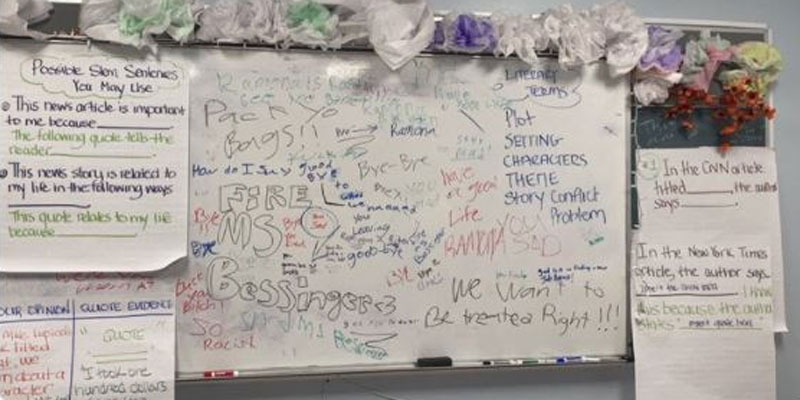As we wait with great anticipation proclamations from on high at the State House as to how we must live our lives in the Ocean State, David Catron’s explanation is worth reading about how some of the Biden administration’s own anti-COVID policies are manifestly not founded in science:
[Open full post]Last Thursday, President Biden announced his “COVID-19 Winter Plan.” Despite his claim that it will fight the disease with “science and speed,” it ignores virtually everything scientists have learned about coronavirus during the past two years. Indeed, it contains a number of elements that epidemiologists have denounced and that evidence has proven counterproductive. These include an irrational emphasis on vaccinating low risk children, the promotion of booster shots that the World Health Organization (WHO) has pronounced ineffective, travel bans that could very well jeopardize efforts to contain future outbreaks, and strident calls for private businesses to bully their employees into getting vaccinated.
Responding to a Josh Hammer column on Newsweek, Instapundit Glenn Reynolds follows up Hammer’s suggestion that Republicans have to “nurture,” not “squander” their political inroads with new voters by highlighting the importance of clarity:
That’s the hard part. But yeah, the GOP is becoming a multiethnic party of small business and the working class, while the Democrats are becoming the party of rich white urbanites.
He also highlights a line from his own April column in the New York Post:
Democrats are now the party of Wall Street, Silicon Valley and upscale suburbs. The people who have to deal with consequences will have to go somewhere else politically. And they will.
When we hear about the need for “a ‘pragmatic,’ ‘socially moderate’ GOP candidate” in Rhode Island, we have to put the words in this broader context. “Social moderate” doesn’t mean “like a liberal Democrat” anymore, because liberal Democrats have become immoderate radicals.
The media will desperately obscure this conclusion, but the Democrats are now the party of the rich and social extremists.
[Open full post]Nobody should feel encouraged by statements from Democrat Mayor Jorge Elorza or the other Democrats who run the city after another shooting in Providence on Saturday night. Elorza may claim to “understand that our community needs and deserves to feel safe,” but that isn’t possible when authorities refuse to be clear about what’s going on.
Most relevant, here, is the early taste of wokism that swept Providence in 2017, essentially deeming talk of “gangs” to be racist and ultimately making it more difficult for police to get their heads around violence, much less prevent it. All that remains, then, is the hope that blind-folded police work plus somehow getting weapons off the street will fix the problems without acknowledging the reality that the Providence area has a growing gang culture. That is not going to work. Worse, the more government creates interactions between residents and authorities that have nothing to do with the problem they’re actually trying to solve, the more mistakes will be made and the more injustices perpetrated.
In contrast, John DePetro posted an investigative report on his site yesterday that shows how mysteries can be solved if we accept the reality of gangs. Investigating the murder of Miya Brophy-Baermann, a young woman murdered in Providence in August, John spots a person featured in a local gang member’s rap video who lived in the area in which Brophy-Baermann was murdered and speculates that the shooting was a case of mistaken identity.
Not only does this context give new significance to reports that the victim of Saturday night’s shooting was “a rapper,” but it shows exactly how deadly Providence’s “Community Safety Act” can be.
With a lead like the one John provides, police could work with information about rival gangs and their vehicles to solve the crime and make arrests. But since 2017, they are forbidden to have even “written notes” of anybody associated with gangs or gang members outside of an official “gang list,” and factors such as “association with other people identified as gang members” cannot be used to include them.
Thus, it would appear possible that no police officer in Providence can legally have a written note that the person who lived near the Brophy-Baermann shooting was in a video with a violent gang member and therefore devote resources to investigating a connection of other gangs to the shooting.
Little wonder Providence officials avoid the word “gang” like a hex. They’re complicit in these deaths.
But what’s the local media’s excuse? What’s the voters?
Featured image by Luis Villasmil on Unsplash.
[Open full post]John the Baptist’s suggestion to Roman soldiers in today’s Gospel reading at Roman Catholic Mass has always left me feeling as I was missing some historical context:
And the crowds asked him, “What then should we do?”
He said to them in reply, “Whoever has two tunics should share with the person who has none. And whoever has food should do likewise.”
Even tax collectors came to be baptized and they said to him, “Teacher, what should we do?”
He answered them, “Stop collecting more than what is prescribed.”
Soldiers also asked him, “And what is it that we should do?” He told them, “Do not practice extortion, do not falsely accuse anyone, and be satisfied with your wages.”
Sharing from one’s surplus makes sense. Not overtaxing people for personal gain makes sense (memo to people in Rhode Island government). And of course not extorting money and not falsely accusing people make sense. But what was going on in ancient Rome to prompt the comment about wages?
I can’t claim to have any new and specific information to answer the question, but this is the first time I’ve noticed this passage since I worked my way through Edward Gibbon’s The Decline and Fall of the Roman Empire, and it occurred to me that buying off or bribing soldiers was a common practice of those who became emperors. Indeed, when Galba reneged on a promised bribe that the head of the Praetorian Guard had made on his behalf to his men, it proved key to his undoing within seven months. That’s one small example, but gaining the support of soldiers by promising wages was common.
Clearly, soldiers’ desire for greater wages was well known in the empire, and its effect on the empire seems relevant to John’s admonition in multiple ways. First, it shows the effect that a broad change of perspective can have on the direction of history because, second, inclining toward dissatisfaction and greed opens the way for corruption and greater evil.
Look at the deterioration and corruption of Rhode Island made possible by a system designed around buying support from special interest groups, with a particular focus on government employees. In John’s time and place as in ours, being an agent of government had advantages which were too often abused, causing harm to both the agents and the people.
Featured image by Giovanni Battista Piranesi on WikiArt.
[Open full post]Ed Driscol draws our attention to an essay on Tablet in which Liel Leibovitz, which definitely deserves the “read the whole thing” tag:
You may be among the increasing numbers of people going through The Turn right now. Having lived through the turmoil of the last half decade—through the years of MAGA and antifa and rampant identity politics and, most dramatically, the global turmoil caused by COVID-19—more and more of us feel absolutely and irreparably politically homeless. Instinctively, we looked to the Democratic Party, the only home we and our parents and their parents before them had ever known or seriously considered. But what we saw there—and in the newspapers we used to read, and in the schools whose admission letters once made us so proud—was terrifying. However we tried to explain what was happening on “the left,” it was hard to convince ourselves that it was right, or that it was something we still truly believed in. That is what The Turn is about. …
… having been there before, I have one important thing to tell you: If the left is going to make it “right wing” to simply be decent, then it’s OK to be right.
Those of us who’ve been comfortable being labeled “on the right” for years (often having undergone the Turn sooner) shouldn’t just be triumphal about Leibovitz’s conversion, because there are important lessons for us in it.
Most progressives, liberals, and et ceteras won’t be bound to the Left with successful careers in ideological alignment, as Liebovitz was, but at a minimum, the political alignment is part of their self-identity and probably roots them in a community to some extent. This means our mockery of their friends will usually be counterproductive. Leibovitz encourages them to ask real questions about what they believe, but it’s up to us to prepare relationships that help the trade. To make the shift more welcoming.
For my part, the most-worthy relationship is that with God, but in a secular world, Truth will do, which means:
- Freedom to question assertions.
- Revulsion at discrimination based on incidental qualities like skin color.
- Willingness to acknowledge facts and trade-offs.
We can offer these principles and more as a common ground, leading (if individual personalities should correspond) to new personal relationships on our side of the chasm.
Remember: when people change their minds on anything that matters, they are saying “good-bye” to something. It’s important to be ready with a “hello.”
Featured image by Tyler Nix on Unsplash.
[Open full post]So far, no deaths are apparently attributable to the Omicron variant of COVID-19:
The World Health Organization (WHO) has informed The Epoch Times that it has not documented any deaths from the Omicron variant of the CCP (Chinese Communist Party) virus, which causes COVID-19.
According to the WHO, “for Omicron, we have not had any deaths reported, but it is still early in the clinical course of disease and this may change.”
When reached for comment by The Epoch Times, the Centers for Disease Control and Prevention (CDC) sent its report on the Omicron variant in the United States from Dec. 1 through 8. It shows that there were no documented deaths from Omicron during that period.
It won’t be long until it’s utterly ridiculous to be basing our panics and continuing government superpowers on case numbers. (I mean, I’m already there, but at some point even the more-timid will have to acknowledge reality, won’t they?)
[Open full post]Lean back a moment and clear your eyes. If you’re older than thirty, recall lessons you learned when you were young — that it is always wrong to discriminate against people based entirely on the color of their skin. Now read this short paragraph:
One of the [Providence school] district’s current incentives, which will continue next school year, is up to $25,000 in loan forgiveness for educators of color. The money is provided by the Rhode Island Foundation.
How is it Constitutional for a government agency to use a private activist organization’s dark money to provide different employment benefits to different teachers based on race? How does anybody see that as okay?
Worse, the paragraph appears in an article about the dire lack of teachers in Providence schools, forcing the state (which is currently running the district) to offer a variety of financial incentives. Well, the teacher shortage can’t be too much of a crisis if promoting the racism of Rhode Island Foundation donors is more important than hiring qualified teachers.
Light-skinned teachers may be thinking twice before binding their careers to an organization that prioritizes racism. Sure, the signing bonuses are piling up across the board, but it’s clear that white teachers are considered to be of lower value than their peers of color. (Perhaps “peers” isn’t the correct term, because they clearly aren’t seen that way.) Any given year, this attitude could result in a policy that makes the discrimination more pronounced and impossible to live with.
Moreover, this sort of favoritism often comes with a danger for the disfavored that they’ll be targeted for one wrong word or targeted for personal reasons but with race as the excuse.
What sort of group mania has captured us that such policies hardly raise an eyebrow?
Featured image of whiteboard harassment of former Providence teacher Ramona Bessinger.
[Open full post]Given the dramatic way in which my tastes and my morality have changed in the last 20 years, I expected (when I finally got around to watching it) that I’d appreciate the dark artistry of the D.C. movie, Joker, even as I was repelled by its nihilistic framing. As dark art (so to speak), it wasn’t as good as I’d been led to believe. In fact, at its closing scene, I wondered whether our culture (at least in the mainstream) has become so soulless that it can’t even make evil compelling. Now I wonder if all the buzz around the movie wasn’t just more play-acting of a rebellion that our society can’t even muster in earnest, now that the rebels control the heights.
The creators of our culture are so disconnected from depth that they can only mimic the forms that used to, in their own time, trade on the depth of that which they were destroying. Honestly, I didn’t think darkness could become so insipid.
If I thought the movie was meant as an ironic reflection of that point, I might think it brilliant, with the image of plastic clown masks in emulation of true evil, but I don’t think it was that clever.
[Open full post]The latest argument, if I’m understanding this correctly, is that we all have to mask because the people who run Rhode Island’s health care system (including regulators and legislators) are incapable of maintaining a workforce:
Facing a debilitating staffing shortage and climbing cases of COVID-19 and hospitalizations, top doctors at Rhode Island’s largest health system are expressing support for reinstating an indoor mask mandate.
“Each of the previous surges was challenging throughout the nation and challenging in Rhode Island,” said Lifespan executive vice president and chief clinical officer Dr. Kenneth Wood during a Zoom press conference held Thursday. “The difference this time is we are doing it in a setting of far fewer staff.” …
“This is one of those circumstances where I think we are somewhat obligated to try and do everything we can to try and turn the curve and flatten the curve of transmission,” said Chief Medical Officer Dr. Dean Roye.
From conversations I’ve had, my understanding is that the latest surge in COVID cases and the slip in nurse numbers has merely tipped a long-building problem over the edge. Thus far, I haven’t been able to find a convincing story in the data, but some early observations are worthwhile.
Let’s start with the COVID numbers and the state’s “new positive cases” chart. Despite near-total vaccination in 2021, the chart shows very limited reduction in new cases from this time last year. (The caveat, here, is that there were a handful of days last year that spiked much higher, and we don’t know, yet, if we’ll have those days this year.)
Yet, the ratio of cases to hospitalization has improved. If we look at new positive tests over a two-week span and compare that with new COVID-positive hospital admissions over a two-week span (with a one-week lag), the trend has been downward. Last year, new hospitalizations were about 6% of new cases. Right now, they’re a little higher than 4%. The percentage of hospitalized people in intensive care or vented is about the same as last year, but obviously, that’s a smaller number.
In short, we shouldn’t be having any panic over hospital capacity.
An interesting interactive tool from the Akron Beacon Journal indicates that there’s room in total inpatient beds, although ICUs are in the red in two counties (suggesting opportunity for resource or patient sharing), but let’s take the hospitals at their word that we’re at “crisis” levels. Why might that be? The issue, we hear, is one of staffing, most importantly of nurses.
According to the National Council of State Boards of Nursing (NCSBN), Rhode Island currently has 27,086 people with active registered nurse licenses issued by the state. Around this time in 2018, that number was 23,242, so it’s grown 17% in three years.
Another angle to consider, long-term, is people who pass the required test for a nursing license. The NCSBM shows 583 test takers in 2011, with 532 passing, in 2011. In 2017, it was 773 and 681. In the latest year available, 2020, the numbers were 777 and 682. So, the total was up from a decade ago, but about the same from 2017.
So what’s the problem?
I’m still working on the answer, but one obvious piece of the puzzle that local journalists haven’t been putting front and center is the governor’s vaccine mandate for healthcare workers. Boston Globe journalist Alexa Gagosz tells me that Lifespan lost 1% of its workforce over the mandate, and 11 were lost to Landmark hospital. Without context, we can just write these off as insignificant numbers, so we have to dig a little.
California has the only mandate for a nurse:patient ratio in the country, and it requires one nurse for every two intensive care patients and 1:5 in most wards. Thus, by this extreme standard, every nurse lost (either layoff or never bothered to apply) reduced the number of ICU beds by 2 or non-ICU beds by 5. In Kent County, 2 more ICU beds would be a 21% increase. Statewide, it would be about a 1% increase for every nurse. That is not a negligible number in a crisis, and as a reminder, this is assuming California’s extreme limit isn’t crazy restrictive.
But that isn’t the end of the obvious regulations.
In 2018, the state government of Rhode Island declined to update its laws in order to maintain its membership in the Nurse Licensure Compact. Consequently, nurses in 38 other U.S. states must go through the licensing process in Rhode Island in order to work here, which directly has an effect on their ability to fill gaps and surely affects families’ decisions about where to move. I’ve requested some numbers to help quantify the effect, but we can assume it’s not nothing.
That’s not all. Don’t forget that earlier this year the General Assembly passed and Governor McKee signed the most demanding minimum standard for nursing home coverage possibly in the entire world. That means a greater demand for nurses within the Rhode Island market. People I know in related businesses have complained that they can’t hire nurses because other organizations are offering so much more money. A candidate will accept the job and be gone as soon as somebody else offers more money.
So, at the same time Rhode Island state government is restricting who can work as a nurse, it is mandating an increase in the number of nurses needed, even as they burn out from COVID demands or directly lose their jobs because they are reluctant to be vaccinated (perhaps because they know they’re already immune from having recovered from the virus). Although I haven’t identified them, I’d wager other contributing regulations could be found, if anybody cared to look.
And for this reason, the “experts” want you and your children to mask constantly in the hopes that it will help a little. There’s socialism in a nutshell: the experts can’t manage the variables, so the people are blamed for insufficient compliance.
We should respond with the obvious truth that government can’t simply will things to be. Management means accepting reality and responsibility.
Featured image by Vladimir Fedotov on Unsplash.
[Open full post]Perhaps no aspect of the public health response to COVID has increased my skepticism more than the insane and dogged practice of ignoring the immunity that people can gain from having and recovering from COVID-19. Whether researchers conclude that it is insufficient, too brief, or whatever, credibility required that it be treated as a real thing, and it wasn’t.
Unfortunately for them, information has a way of getting out:
Immunity people enjoy after recovering from COVID-19 is better than the protection bestowed from vaccination, according to a new study from Israel.
Researchers analyzing data from the county’s health database from August to September found both COVID-19 infections and severe disease were higher among the vaccinated than those who recovered from the illness, also known as people with natural immunity.
For instance, the naturally immune had a 10.5 per 100,000 infection rate four to six months following their recovery, versus a 69.2 per 100,000 rate among the vaccinated.
I’ve been pointing out for months that naturally acquired immunity appears to be stronger than vaccination, but that vaccination improves odds even more if you’ve recovered from the virus. But (again) the numbers are so low that having had it, being vaccinated, or being young and fit are all sufficient.
[Open full post]





